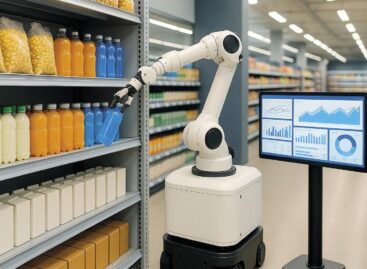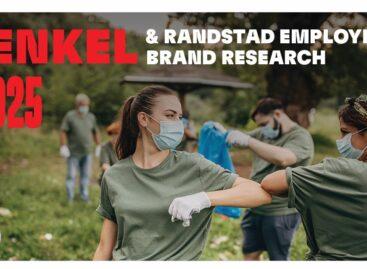With efficient tools for achieving sustainability
The pandemic came like an evolutionary shock to everyone, generating a crisis in demand and supply – and entailing an existential crisis as well. Hungarian FMCG companies reacted well to the shock.

Dr. Ágnes Fábián
president
Branded Goods Association Hungary
Dr Ágnes Fábián, managing director of Henkel Magyarország Kft. and president of Branded Goods Association Hungary (BGA Hungary) talked to our magazine about the three main trends of the so-called ‘new normal’. Number one is that safety became much more important than before: companies are reviewing their supply chains and trying to minimise risks – formerly cost-efficiency was the main priority. The second trend is the transformation of corporate culture: safety and reliability are the key factors here as well. Number three is changing consumption and product selection: Ms Fábián reckons that at the times of crisis low-price and premium products sell well. The competition also becomes fierce between branded and private label products.
Unacceptable strategies

Balázs Győrffy
president
Hungarian Chamber of Agriculture
The Hungarian Chamber of Agriculture (NAK) is dedicated to the cause of sustainability in the fields of the environment, the society and the economy. President Balázs Győrffy told our magazine: a farmer only produces sustainably if their activities are sustainable from an economic perspective too. This can only be achieved with constant technological development and innovation. As regards the EU’s environmental protection policy, NAK stands on the same platform as Copa-Cogeca, namely that farmers need safe equipment for fighting pests and diseases, but stricter environmental requirements shouldn’t put them in a position where they can’t compete with produce from third countries because of the extra costs of green production. Consequently, NAK doesn’t accept the European Commission’s From Farm to Fork strategy and its Biodiversity Strategy, because they set out objectives that simply can’t be met.
The pandemic made consumers more eco-conscious

Krisztina Bodnár
business development
manager
GfK
GfK interviewed more than 1,000 consumers in Hungary and more than 30,000 worldwide as part of the Consumer Life survey in 2019, to identify the most important trends, concerns and expectations. It turned out that safety, simplicity and environmental protection are the top needs. GfK’s business development manager Krisztina Bodnár revealed: at a European level eco-consciousness finished at the top of the list, while in Hungary conscious consumption was the first choice – eco-consciousness came in second. Eco-conscious thinking was already a consumer trend before the pandemic, but the coronavirus made this issue even more important for consumers. In April 2020 43 percent of Hungarian consumers said to GfK that they will spend less on food products which aren’t absolutely necessary. In early June 40 percent of shoppers said they will purchase more products from local producers, to revitalise the economy and to act eco-consciously. Ms Bodnár believes that when their uncertainty passes, shoppers will be ready to pay extra money for purchasing more sustainable products once again. //
Essity and sustainability
Essity’s business operations have been designed to support the Sustainable Development Goals that the United Nations defined in 2015. Priority objectives for Essity include health and well-being, gender equality, clean water and sanitation, responsible consumption and production, climate action and life on land. //
Alpro is “Good for You”

Buzási Dániel
cégvezető
Danone Magyarország
At Alpro, we have dreamt a world where all the products are made of plants – seeds, cereals, fruits and soy. Why? Because a plant-based diet is sustainable for the planet and good for our health. Eating sustainably has become a strategic issue, as the planet’s population is growing and there are only limited natural resources available.‘ Good for you’ is our brand’s slogan, which seeks to reassure those who choose Alpro products that they made the right decision: they not only follow a diverse diet but also contribute to protecting the environment. //
Tradition and innovation

Sára Palcsó
marketing director
Zwack Unicum
In 2019-2020 Zwack keeps focusing on the nine important areas identified in the company’s sustainability strategy, with the emphasis being on environmental protection. Our efforts for achieving a circular economy are illustrated by the fact that since 1 September 2019 Zwack has been using electricity that comes from renewable sources. At the moment we utilise 95 percent of the waste we produce – as our slogan says it, ‘For You and for Our Future!’ . //
Question marks

Norbert Höflinger
strategy director
HWD Recycling
Norbert Höflinger, strategy director of HWD Recycling Kft. is a bit pessimistic when it comes to sustainability, as he thinks that the confusion surrounding the ban on single-use plastics didn’t help the cause. He supports the deposit scheme: everyone will return the PET bottle if they get 25 euro cents for it. In his view, the FMCG sector has made progress and HWD Recycling supports partners in their efforts. //
Related news
Change in Zwack management: Csaba Belovai is the new CEO of Zwack Unicum Plc.
According to the decision of the owners of Zwack Unicum…
Read more >Dr Tamás Kozák: “High inflation casts a long shadow”
Our magazine asked Dr Tamás Kozák, general secretary of the…
Read more >Henkel Hungary: Career, values, timeless trust
One of the world’s most comprehensive employer brand research studies,…
Read more >Related news
Corporate leaders’ commitment to sustainability at record level
According to the latest data from the K&H Sustainability Index,…
Read more >FAO food price index rose slightly in June due to higher prices of meat, dairy products and vegetable oils
The Food and Agriculture Organization of the United Nations (FAO)…
Read more >What can cause the price of a wine to increase tenfold?
There are fewer of them worldwide than the number of…
Read more >






